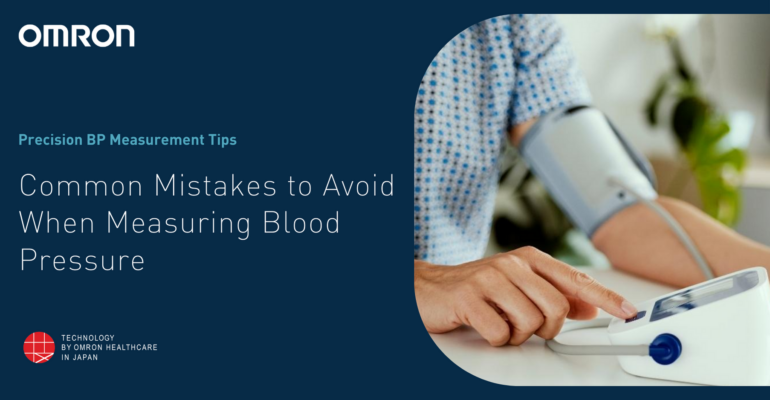Common Mistakes to Avoid When Measuring Blood Pressure
November 5, 2023 2024-02-16 16:12Common Mistakes to Avoid When Measuring Blood Pressure

Common Mistakes to Avoid When Measuring Blood Pressure
High blood pressure, or hypertension, is a widespread health issue that affects millions of people worldwide. It’s a silent killer, often shows no symptoms until it leads to serious health problems, such as heart disease, stroke, or kidney damage.
To manage hypertension effectively, it’s crucial to measure blood pressure accurately. Unfortunately, many people make common mistakes when measuring their blood pressure, which can lead to inaccurate readings and incorrect treatment decisions.
10 Common mistakes to avoid when measuring blood pressure
- Using the Wrong-Sized Cuff: When it comes to measuring blood pressure, one of the most frequently made errors is the usage of an incorrectly sized cuff. Cuff size matters because it can significantly affect the accuracy of your readings. Using a cuff that is too small for your arm can lead to artificially high readings, while a cuff that is too large can result in falsely low measurements.
To avoid this mistake, make sure you select the right-sized cuff. Most blood pressure monitors come with guidelines for choosing the appropriate cuff size. Measure the circumference of your upper arm and select a cuff that matches your measurement.
- Not Resting Properly: Blood pressure can vary throughout the day, so it’s essential to measure it under consistent conditions. Failure to rest properly before taking a reading is a common error. Factors like physical activity, stress, and caffeine intake can all affect blood pressure.
To obtain accurate measurements, sit quietly and relax for at least five minutes before measuring your blood pressure. Avoid talking or moving during this time. Additionally, it’s advisable to refrain from smoking or consuming caffeine for at least 30 minutes before taking a reading.
- Incorrect Arm Positioning: When measuring blood pressure, the posture of your arm is crucial. Placing your arm at the wrong height or in an improper posture can lead to inaccurate results. Ensure that your arm is supported at heart level and that your feet are flat on the ground. Your arm should rest comfortably on a table or armrest.
- Talking or Moving During Measurement: Talking or moving during blood pressure measurement can elevate your readings. To ensure accuracy, remain still and silent during the process. Even small movements or conversations can affect the results, leading to artificially high readings.
- Improper Timing: The timing of your blood pressure measurement is crucial. For instance, taking your blood pressure immediately after a meal or after physical activity can yield inaccurate results. It’s recommended to wait at least 30 minutes after eating or exercising before measuring your blood pressure. For consistency, take measurements at the same time every day.
- Not Emptying the Bladder: A full bladder can affect your blood pressure readings. The urge to urinate can cause anxiety and discomfort, both of which may lead to higher readings. Therefore, it’s advisable to empty your bladder before taking your blood pressure.
- White-Coat Syndrome: White-coat syndrome is a condition in which a person’s blood pressure rises in a medical setting due to anxiety or stress. Many individuals experience this phenomenon, which can lead to artificially elevated readings. To mitigate white-coat syndrome, consider taking your blood pressure at home using a reliable home blood pressure monitor. This allows you to measure your blood pressure in a more comfortable and familiar environment, providing more accurate results.
- Inadequate Rest Between Measurements: It is crucial to allow a minimum of one to two minutes between each blood pressure measurement. It is important to avoid taking readings too closely together because doing so can lead to artificially high readings. To get the most accurate results, be patient and allow adequate time between measurements.
- Using an Old or Inaccurate Device: If you’re using an outdated or inaccurate blood pressure monitor, it can lead to unreliable readings. Over time, the accuracy of blood pressure monitors can decrease affecting their precision. Regularly check the calibration of your device and replace it if it’s outdated or no longer accurate.
- Not Keeping a Log: Failing to keep a record of your blood pressure measurements is a common mistake. Monitoring your blood pressure over time can provide valuable insights into your health and help your healthcare provider make more informed treatment decisions. Consider using a dedicated blood pressure log or a smartphone app to track your measurements.
Omron blood pressure monitors are often equipped with state-of-the-art technology and offer valuable insights for monitoring blood pressure changes over time. With the ease of use and accuracy that Omron devices offer, they play a vital role in helping individuals monitor their blood pressure effectively at home.
Always consult with your healthcare provider for guidance on monitoring and managing your blood pressure, as they can provide valuable insights and help you make informed decisions about your health. Remember that hypertension is a manageable condition, and with proper monitoring and lifestyle adjustments, you can reduce your risk of serious health complications.
In conclusion,
Accurate blood pressure measurement is crucial for the effective management of hypertension. By avoiding these common mistakes, you can ensure that your blood pressure readings are as precise as possible.
Reference:
- https://www.who.int/news-room/fact-sheets/detail/hypertension
- https://world-heart-federation.org/what-we-do/hypertension/#:~:text=Hypertension%20is%20often%20known%20as,as%20end%20organ%20damage%20such
- https://www.heart.org/en/news/2018/05/10/are-blood-pressure-measurement-mistakes-making-you-chronically-ill
- https://www.omronbrandshop.com/blood-pressure-monitors/






